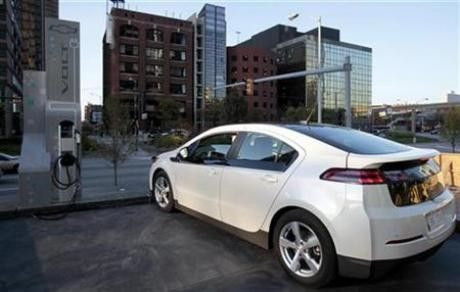U.S. probes EV batteries after Chevy Volt fire

WASHINGTON/DETROIT (Reuters) - U.S. regulators are investigating the safety of batteries used to power electric vehicles after a General Motors Co Chevrolet Volt caught fire following a routine crash test.
The National Highway Traffic Safety Administration said on Friday that it has asked other manufacturers who make electric cars or who plan to do so for information on how they handle lithium-ion batteries. The request also includes recommendations for minimizing fire risk.
NHTSA said it does not believe the Volt and other electric vehicles are at greater risk for fire than gasoline-powered engines.
First and foremost, I want to make this very clear: The Volt is a safe car, Jim Federico, GM chief engineer for electric vehicles, said in a statement.
We are working cooperatively with NHTSA as it completes its investigation, he added. However, NHTSA has stated that based on available data, there's no greater risk of fire with a Volt than a traditional gas-powered car.
The Volt is a plug-in electric hybrid that also has a gasoline engine. The Volt crash test was conducted last May at a facility in Wisconsin. The fire did not break out until more than three weeks later.
GM said it was not aware of any other Volt fires. A senior NHTSA official said the agency has received no consumer complaints about fires involving GM or other electric cars.
Both GM and NHTSA conducted follow-up tests and could not repeat the fire. The agency plans additional electric car battery tests with Energy Department experts in coming weeks.
GM shares were off 12 cents in late trade on the New York Stock Exchange at $22.58.
If safety concerns were to slow the uptake of electric vehicles, that could endanger President Barack Obama's goal of putting a million EVs on the road by 2015.
To drive that goal, the Energy Department has provided about $2.5 billion in funding to battery companies, automakers and related firms in recent years.
A range of new electric vehicles, including the Volt and upcoming models from Tesla Motors Inc and Fisker, are powered by the same kind of lithium-ion batteries that have long been used in consumer electronics.
Those batteries deliver the power and range that electric vehicles require, but the current generation of lithium-ion batteries also has a tendency to overheat.
Nissan Motor Co Ltd makes the other mass-produced electric car, the Leaf. Nissan officials said there have been no reports of Leaf fires.
The Nissan Leaf battery pack has been designed with multiple safety systems in place to help ensure its safety in the real world, Nissan spokesman David Reuter said.
All of our systems have been thoroughly tested to ensure real-world performance, he added. To date, the more than 8,000 Nissan Leafs driving on the U.S. roads have performed without reported incident.
South Korean battery maker LG Chem Ltd, which supplies the Volt battery cells, had no immediate comment. Officials at Tesla, Fisker and battery maker A123 Systems Inc could not immediately be reached.
NHTSA said the Volt crash test last May -- a side-impact test -- damaged the battery pack, but the exact reason for the fire is not yet clear.
Apparently, there was some cell activity, latent activity that resulted in the fire, the NHTSA official said. That cell activity we don't know.
The Volt carries a nearly 400-pound lithium-ion battery in a T-shape that sits across the rear and runs down the middle of the car between the passenger seats.
American consumers have been slow to embrace electric and rechargeable vehicles, in part because of their additional cost. Pure electric vehicles like the Leaf also have limited range before recharging.
The Volt has a gas-powered 1.4-liter engine to provide additional range after it has run about 40 miles on a fully-charged battery.
GM has sold about 5,000 Volts. The plug-in hybrid costs $40,000 before a $7,500 consumer tax credit.
(Additional reporting by Kevin Krolicki in Detroit; Editing by Derek Caney, Gerald E. McCormick and John Wallace)
© Copyright Thomson Reuters 2024. All rights reserved.





















